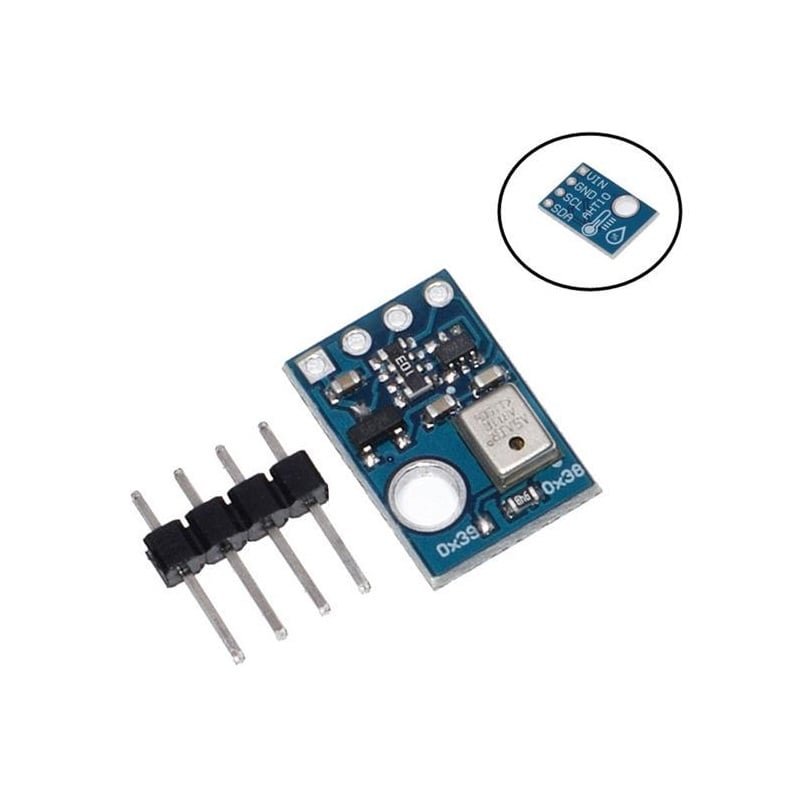DataSheet AHT10 High Precision Digital Temperature And Humidity Measurement Module

- Version
- Download 15
- File Size 875.22 KB
- File Count 2
- Create Date March 26, 2024
- Last Updated March 27, 2024
The AHT10 High Precision Digital Temperature And Humidity Measurement Module is a new generation of temperature and humidity sensors, sets a new standard in size and intelligence: it is embedded in a dual-row flat leadless SMD package for reflow soldering with a 4 x 5mm bottom and a height of 1.6mm. The sensor outputs a calibrated digital signal in standard I 2C format.
The AHT10 is equipped with a newly designed ASIC-specific chip, an improved MEMS semiconductor capacitive humidity sensing element and a standard on-chip temperature sensing element. Its performance has been greatly improved beyond the reliability level of previous generation sensors. The first generation of temperature and humidity sensors have been improved to make them more stable in harsh environments.
This sensor gives a calibrated digital signal outputs in standard I2C format. The AHT10 is equipped with a newly designed ASIC-specific chip, an improved MEMS semiconductor capacitive humidity sensing element and a standard on-chip temperature sensing element. Its performance has been greatly improved beyond the reliability level of previous generation sensors
Specifications and Features:
- Interface type: I2C
- Working voltage: 1.8 – 6.0 V
- Interface size: 4*2.54mm pitch
- Humidity accuracy: typical ± 2%
- Humidity resolution: 0.024%
- Temperature accuracy: typical ± 0.3 ° C
- Temperature resolution: Typical 0.01 °C
- Working temperature: -40°C–85°C
Package Includes:
1 x Digital Temperature and Humidity Sensor
// www.ekostra.com
/***************************************************************************************************/
/*
This is an Arduino library for Aosong ASAIR AHT10, AHT15 Digital Humidity & Temperature Sensor
written by : enjoyneering79
sourse code: https://github.com/enjoyneering/
This chip uses I2C bus to communicate, specials pins are required to interface
Board: SDA SCL Level
Uno, Mini, Pro, ATmega168, ATmega328..... A4 A5 5v
Mega2560................................. 20 21 5v
Due, SAM3X8E............................. 20 21 3.3v
Leonardo, Micro, ATmega32U4.............. 2 3 5v
Digistump, Trinket, ATtiny85............. 0/physical pin no.5 2/physical pin no.7 5v
Blue Pill, STM32F103xxxx boards.......... PB7 PB6 3.3v/5v
ESP8266 ESP-01........................... GPIO0/D5 GPIO2/D3 3.3v/5v
NodeMCU 1.0, WeMos D1 Mini............... GPIO4/D2 GPIO5/D1 3.3v/5v
ESP32.................................... GPIO21/D21 GPIO22/D22 3.3v
Frameworks & Libraries:
ATtiny Core - https://github.com/SpenceKonde/ATTinyCore
ESP32 Core - https://github.com/espressif/arduino-esp32
ESP8266 Core - https://github.com/esp8266/Arduino
STM32 Core - https://github.com/stm32duino/Arduino_Core_STM32
- https://github.com/rogerclarkmelbourne/Arduino_STM32
GNU GPL license, all text above must be included in any redistribution,
see link for details - https://www.gnu.org/licenses/licenses.html
*/
/***************************************************************************************************/
#include <AHT10.h>
#include <Wire.h>
uint8_t readStatus = 0;
AHT10 myAHT10(AHT10_ADDRESS_0X38);
void setup()
{
Serial.begin(115200);
Serial.println();
while (myAHT10.begin() != true)
{
Serial.println(F("AHT10 not connected or fail to load calibration coefficient")); //(F()) save string to flash & keeps dynamic memory free
delay(5000);
}
Serial.println(F("AHT10 OK"));
//Wire.setClock(400000); //experimental I2C speed! 400KHz, default 100KHz
}
void loop()
{
/* DEMO - 1, every temperature or humidity call will read 6 bytes over I2C, total 12 bytes */
Serial.println(F("DEMO 1: read 12-bytes, show 255 if communication error is occurred"));
Serial.print(F("Temperature: ")); Serial.print(myAHT10.readTemperature()); Serial.println(F(" +-0.3C")); //by default "AHT10_FORCE_READ_DATA"
Serial.print(F("Humidity...: ")); Serial.print(myAHT10.readHumidity()); Serial.println(F(" +-2%")); //by default "AHT10_FORCE_READ_DATA"
/* DEMO - 2, temperature call will read 6 bytes via I2C, humidity will use same 6 bytes */
Serial.println(F("DEMO 2: read 6 byte, show 255 if communication error is occurred"));
Serial.print(F("Temperature: ")); Serial.print(myAHT10.readTemperature(AHT10_FORCE_READ_DATA)); Serial.println(F(" +-0.3C"));
Serial.print(F("Humidity...: ")); Serial.print(myAHT10.readHumidity(AHT10_USE_READ_DATA)); Serial.println(F(" +-2%"));
/* DEMO - 3, same as demo2 but different call procedure */
Serial.println(F("DEMO 3: read 6-bytes, show 255 if communication error is occurred"));
readStatus = myAHT10.readRawData(); //read 6 bytes from AHT10 over I2C
if (readStatus != AHT10_ERROR)
{
Serial.print(F("Temperature: ")); Serial.print(myAHT10.readTemperature(AHT10_USE_READ_DATA)); Serial.println(F(" +-0.3C"));
Serial.print(F("Humidity...: ")); Serial.print(myAHT10.readHumidity(AHT10_USE_READ_DATA)); Serial.println(F(" +-2%"));
}
else
{
Serial.print(F("Failed to read - reset: "));
Serial.println(myAHT10.softReset()); //reset 1-success, 0-failed
}
delay(10000); //recomended polling frequency 8sec..30sec
}
AHT10-master.zip
AHT10.pdf
